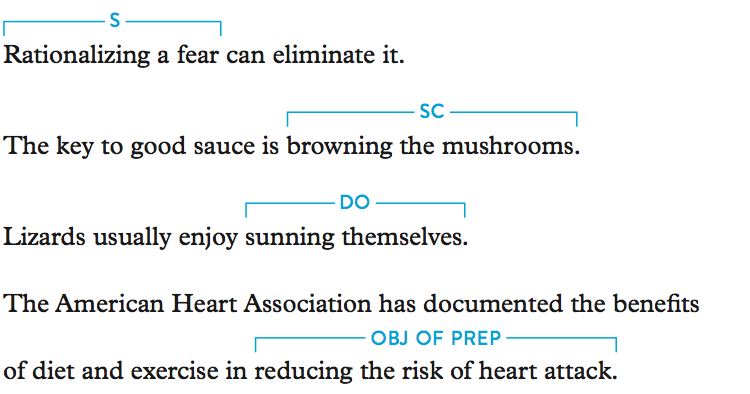48b. Verbal phrases
A verbal is a verb form that does not function as the verb of a clause. Verbals include infinitives (the word to plus the base form of the verb), present participles (the -ing form of the verb), and past participles (the verb form usually ending in -d, -ed, -n, -en, or -t). (See 27a and 46c.)
| infinitive | presentparticiple | pastparticiple |
| to dream | dreaming | dreamed |
| to choose | choosing | chosen |
| to build | building | built |
| to grow | growing | grown |
Instead of functioning as the verb of a clause, a verbal functions as an adjective, a noun, or an adverb.
| adjective | Broken promises cannot be fixed. |
| noun | Constant complaining becomes wearisome. |
| adverb | Can you wait to celebrate? |
Verbals with objects, complements, or modifiers form verbal phrases.
In my family, singing loudly is more appreciated than singing well.
Governments exist to protect the rights of minorities.
Like verbals, verbal phrases function as adjectives, nouns, or adverbs. Verbal phrases are ordinarily classified as participial, gerund, and infinitive.
Participial phrases
Participial phrases always function as adjectives. Their verbals are either present participles (such as dreaming, asking) or past participles (such as stolen, reached).
Participial phrases frequently appear immediately following the noun or pronoun they modify.

Participial phrases are often movable. They can precede the word they modify.

They may also appear at some distance from the word they modify.

Gerund phrases
Gerund phrases are built around present participles (verb forms that end in -ing), and they always function as nouns: usually as subjects, subject complements, direct objects, or objects of a preposition.

Infinitive phrases
Infinitive phrases, usually constructed around to plus the base form of the verb (to call, to drink), can function as nouns, as adjectives, or as adverbs. When functioning as a noun, an infinitive phrase may appear in almost any noun slot in a sentence, usually as a subject, subject complement, or direct object.

Infinitive phrases functioning as adjectives usually appear immediately following the noun or pronoun they modify.

The infinitive phrase modifies the noun right. Which right? The right to vote.
Adverbial infinitive phrases usually qualify the meaning of the verb, telling when, where, how, why, under what conditions, or to what degree an action occurred.

note: In some constructions, the infinitive is unmarked; that is, the to does not appear. (See 28f.)
Graphs and charts can help researchers [to] present complex data.